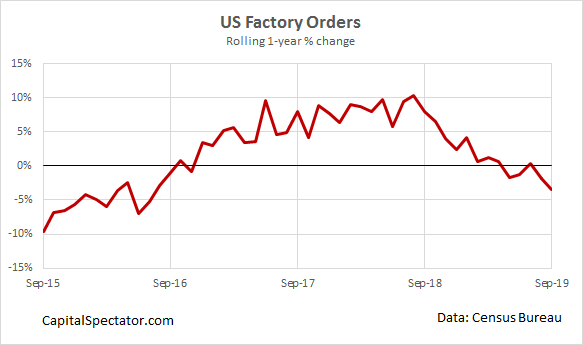US and China consider paring trade tariffs for initial trade deal: WSJ
China’s President Xi says he has ‘confidence’ in Hong Kong leader: BBC
OPEC trims oil-demand forecast, citing “stress” in world economy: CNBC
US formally begins exiting Paris climate agreement: Reuters
UK services sector remained stagnant in October: IHS Markit
Eurozone producer price inflation fell to 3yr low: -1.2% in Sep: Eurostat
Slightly stronger modest growth expected for ISM Non-Mfg Index in October
US factory orders fell 3.5% in Sep vs. year-ago level–weakest in 3 years:
US Stocks Led Most Global Markets Higher Last Week
Equities in the United States edged out the rest of the world for the trading week’s performances ended Friday, Nov. 1, based on a set of exchange-traded funds that represent the major asset classes.
Continue reading
Macro Briefing | 4 November 2019
US and China signal progress on trade talks: Bloomberg
South East Asian countries to sign Asia Pacific trade pact in 2020: CNBC
The Senate may in play for Dems in 2020 election: The Hill
Iran moves further away from compliance with nuclear pact: Reuters
US equity market’s rally is the world’s top performer: WSJ
Eurozone mfg recession will act as ‘severe drag’ on Q4 GDP: IHS Markit
US economic modeling favors Trump’s re-election: Bloomberg
US payrolls rose more than expected in October: Reuters
Mild recession for US manufacturing continued in Oct via ISM data: MW
PMI data for Oct reflect modest increase in US manufacturing activity: IHS Markit
Construction spending in US rose 0.5% in Sep, more than forecast: TT
US stock market volatility (VIX Index) remains close to 3-month low:
Book Bits | 2 November 2019
● The Great Reversal: How America Gave Up on Free Markets
By Thomas Philippon
Summary via publisher (Belknap Press/Harvard University Press)
A leading economist argues that many key problems of the American economy are due not to the flaws of capitalism or the inevitabilities of globalization but to the concentration of corporate power. By lobbying against competition, the biggest firms drive profits higher while depressing wages and limiting opportunities for investment, innovation, and growth… American markets, once a model for the world, are giving up on healthy competition. Sector after economic sector is more concentrated than it was twenty years ago, dominated by fewer and bigger players who lobby politicians aggressively to protect and expand their profit margins. Across the country, this drives up prices while driving down investment, productivity, growth, and wages, resulting in more inequality. Meanwhile, Europe—long dismissed for competitive sclerosis and weak antitrust—is beating America at its own game.
US Payrolls Rose In October But 1-Year Trend Is Still Slipping
Companies added more workers than expected in October, according to the US Labor Department. The news is welcome, largely because the crowd was looking for a much-weaker gain. Good news, as far as it goes. But it’s premature to celebrate. Indeed, as The Capital Spectator projected, the one-year trend continued to edge down, reaffirming that the labor market appears to be caught in a gradual but persistent downturn.
Major Asset Classes | October 2019 | Performance Review
The old investing proverb that markets like to climb a wall of worry was reaffirmed in dramatic fashion last month. Indeed, all the major asset classes posted gains in October. In fact, the latest installment of across-the-board increases marks the third time so far this year that the crowd bid up prices in everything in a calendar month. (January and June also posted gains in every primary slice of the global markets.) Continue reading
Macro Briefing | 1 November 2019
House approves Trump impeachment rules in partisan vote: The Hill
Trump attacks Fed Chairman Powell a day after rate cut: CNBC
Economists expect hiring will slow in today’s Oct jobs report: Bloomberg
Private survey shows China’s mfg sector expanded in Oct: CNBC
Corporate profits are stronger than expected but still on track to weaken: WSJ
US jobless claims rise, but indicator still reflects strong labor market: Reuters
Chicago PMI fell to nearly four-year low in October: MW
Announced job cuts in US up 21% in October vs. September: CG&C
Wage inflation ticked higher in third quarter, but remains moderate: MStar
Consumer spending’s 1-year trend in US edged up in Sep, posting moderate gain:
Russia/Eastern Europe And US Stocks Lead Global Markets In 2019
All the world’s major equity regions continue to post year-to-date gains, but stocks in Eastern Europe/Russia, followed closely by US shares, are in the lead by a healthy margin, based on a set of exchanged-listed funds.
Macro Briefing | 31 October 2019
Chinese officials raise new doubts about a trade deal with the US: Bloomberg
China’s official manufacturing PMI dips deeper into recession in Oct: CNBC
House set for first floor vote on impeachment today: The Hill
Federal Reserve cuts its target rate 1/4 point to 1.5%-1.75% range: Bloomberg
Fed rate cut prompts dissents from two Fed officials: WSJ
US GDP growth in Q3 eased slightly to modest 1.9% gain: MW
US private employment’s 1-year growth trend slips to 8-year low in October: ADP
Tracking Macro Factors In Portfolio Strategies
Earlier this month I briefly reviewed a recent BlackRock report that highlighted that macroeconomic factors are typically driving investment strategy results. As a follow-up, let’s take a quick look at a basic real-world example of analyzing portfolios through a macroeconomic lens.




